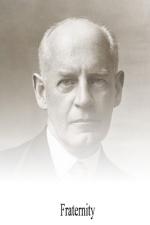He reached home at half-past ten. The lamp was burning in Mr. Stone’s room, and his window was, as usual, open; that which was not usual, however, was a light in Hilary’s own bedroom. He went gently up. Through the door-ajar-he saw, to his surprise, the figure of his wife. She was reclining in a chair, her elbows on its arms, the tips of her fingers pressed together. Her face, with its dark hair, vivid colouring, and sharp lines, was touched with shadows, her head turned as though towards somebody beside her; her neck gleamed white. So—motionless, dimly seen—she was like a woman sitting alongside her own life, scrutinising, criticising, watching it live, taking no part in it. Hilary wondered whether to go in or slip away from his strange visitor.
“Ah! it’s you,” she said.
Hilary approached her. For all her mocking of her own charms, this wife of his was strangely graceful. After nineteen years in which to learn every line of her face and body, every secret of her nature, she still eluded him; that elusiveness, which had begun by being such a charm, had got on his nerves, and extinguished the flame it had once lighted. He had so often tried to see, and never seen, the essence of her soul. Why was she made like this? Why was she for ever mocking herself, himself, and every other thing? Why was she so hard to her own life, so bitter a foe to her own happiness? Leonardo da Vinci might have painted her, less sensual and cruel than his women, more restless and disharmonic, but physically, spiritually enticing, and, by her refusals to surrender either to her spirit or her senses, baffling her own enticements.
“I don’t know why I came,” she said.
Hilary found no better answer than: “I am sorry I was out to dinner.”
“Has the wind gone round? My room is cold.”
“Yes, north-east. Stay here.”
Her hand touched his; that warm and restless clasp was agitating.
“It’s good of you to ask me; but we’d better not begin what we can’t keep up.”
“Stay here,” said Hilary again, kneeling down beside her chair.
And suddenly he began to kiss her face and neck. He felt her answering kisses; for a moment they were clasped together in a fierce embrace. Then, as though by mutual consent, their arms relaxed; their eyes grew furtive, like the eyes of children who have egged each other on to steal; and on their lips appeared the faintest of faint smiles. It was as though those lips were saying: “Yes, but we are not quite animals!”
Hilary got up and sat down on his bed. Blanca stayed in the chair, looking straight before her, utterly inert, her head thrown back, her white throat gleaming, on her lips and in her eyes that flickering smile. Not a word more, nor a look, passed between them.
Then rising, without noise, she passed behind him and went out.
Hilary had a feeling in his mouth as though he had been chewing ashes. And a phrase—as phrases sometimes fill the spirit of a man without rhyme or reason—kept forming on his lips: “The house of harmony!”




